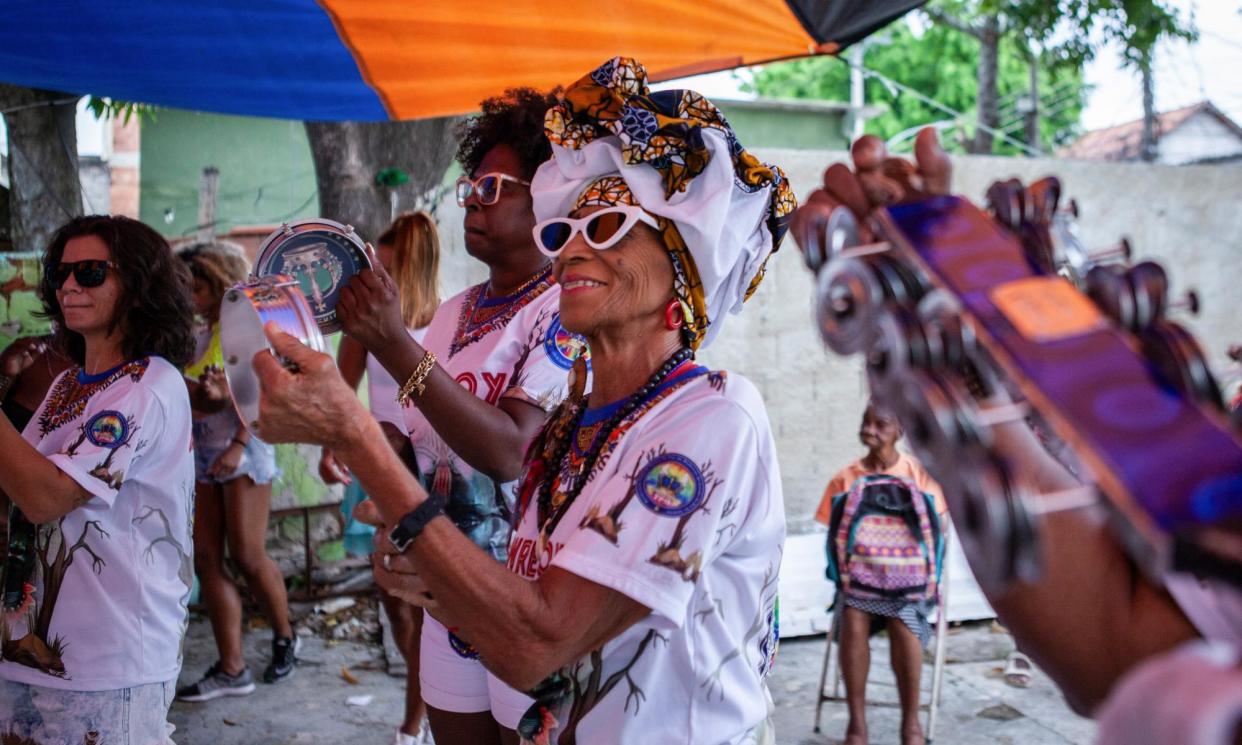‘Enough of being bossed around by men’: Brazil’s first all-women samba school dances to its own beat

Preparations for Brazil’s carnival are in full swing in Madureira, a neighbourhood in Rio de Janeiro famed for its strong samba tradition. In a courtyard strewn with colourful paper and fabric scraps, a handful of women are working on costumes.
The mostly middle-aged black women snipping, gluing and painting belong to one of Rio’s newest samba schools: Turma da Paz de Madureira (TPM), or the Madureira Group of Peace. All of its members, from the directors down to the percussionists and dancers, are women.
“We are the only all-female samba school in Brazil,” says Barbara Rigaud, TPM’s president and founder.
Women have always been closely involved in Rio’s samba schools, not just as tailors and sparkly samba muses but also as musicians and participants in the creative process. Yet rarely have they occupied positions of power, or had their contributions to these community based musical organisations recognised. The pioneer sambista Dona Ivone Lara famously had to let male relatives sign her compositions for years before she became, in 1965, the first woman to be accepted as a composer in a samba school, the Madureira-based Império Serrano.
“There was a constant presence of women in these spaces, they participated actively, and not just as hypersexualised [dancers],” says the historian Alessandra Tavares, highlighting the objectification of (usually black) women that has long dominated stereotypes of Rio’s carnival. “History never gave women the visibility they were due.”
Rigaud is striving to change that. “Enough of being bossed around by men,” says the 55-year-old, who runs a beauty salon when she isn’t putting her heart and soul into carnival productions.
We face a lot of prejudice and mockery because we’re being innovative
Barbara Rigaud, TPM president and founder
A survivor of sexual violence in a country where a woman or girl was raped every eight minutes in the first six months of 2023, Rigaud feels that bringing women together in this way can help transform lives. “I think women join TPM because they have freedom here, they can see their worth and how important they are,” she says during a conversation in the courtyard that serves as the school’s headquarters and rehearsal ground.
Gisele Rosires, a security professional whose life has been marked by hardship and loss, agrees. “I always say that TPM saved me,” says Rosires, 47, who plays the surdo drum, a bulky instrument long considered the preserve of men. “Lots of girls are struggling. And when you see one succeeding, that incentivises another. I think that’s what makes TPM different, it empowers people.”
***
TPM was born in 2013 as a women-only bloco, a musical group that leads carnival street parties. Its debut performance as Rio’s first all-female samba school was last year, with about 320 members parading in the lowest-tier samba league in the city’s northern suburbs (only the schools in the top leagues perform in the purpose-built Sambadrome, 20km away in the city centre). It came third and this year will compete in the bronze league with a 600-strong procession featuring 100 percussionists and an eight metre-long float.
The samba-enredo song they have chosen for 17 February’s parade is a re-edition of a composition first performed by Império Serrano, aptly named Lugar de Mulher É Onde Ela Quiser! (A woman’s place is wherever she wants).
Rigaud, who acts as creative director, has envisioned a dozen sections of dancers and musicians in costumes paying tribute to pioneering female figures, such as the indigenous warrior Clara Camarão, and celebrate everyday empowered women, such as an entrepreneur, a police officer and a university graduate.
Meeting that vision is no easy task, however, and Rigaud has had to get creative, recycling costumes used in last year’s parade and picking up donated or discarded materials wherever possible. “This was rubbish, but not any more. It’s being turned into gold,” she says, pointing to scraps of velvet.
According to the rules that govern Rio’s samba parades, TPM’s procession will not be 100% female as it is obliged to feature two men as masters of ceremony. “It’s a privilege [to be involved],” says one of these dancers, 37-year-old Henrique Seixas. “What these women are doing … I think it’s incredible.”
Preparing for carnival is a logistical and financial challenge for any samba school, but the smaller ones cannot rely on their fame for sponsorship and depend on local government funding, which is often delayed. TPM members also feel they face more obstacles than most due to persistent sexism and patriarchal norms – starting with the sniggers that sometimes meet their name, as TPM in Portuguese is also the acronym for premenstrual syndrome. This was an accidental coincidence which Rigaud and her co-founders have embraced as a funny joke.
“We face a lot of prejudice and mockery because we’re being innovative, you see? Getting such a large number of women together, it’s different,” she says.
Percussion conductor Paloma Bento laments that rehearsals this year have been sparsely attended. “We recently lost a percussionist because her 90-year-old mother became bed-bound and depends on her for everything. There’s this other woman who often has to look after her grandchildren. I don’t think this would be happening if they were men,” says Bento, 34. Women are the main breadwinner in more than half of Brazilian households (15% are headed by single mothers), yet on average they spend nearly twice as much time as men on domestic chores and care work.
Related: ‘Joy and resistance’: South America’s female football fans on their love of the game – in pictures
But these challenges will be forgotten as TPM members begin their 400-metre procession this month. “On the day of the parade, everything will work out, like it did last year,” says Bento. “This year’s performance will be better than last year’s, and next year it will be better still.”

 Yahoo News
Yahoo News 
